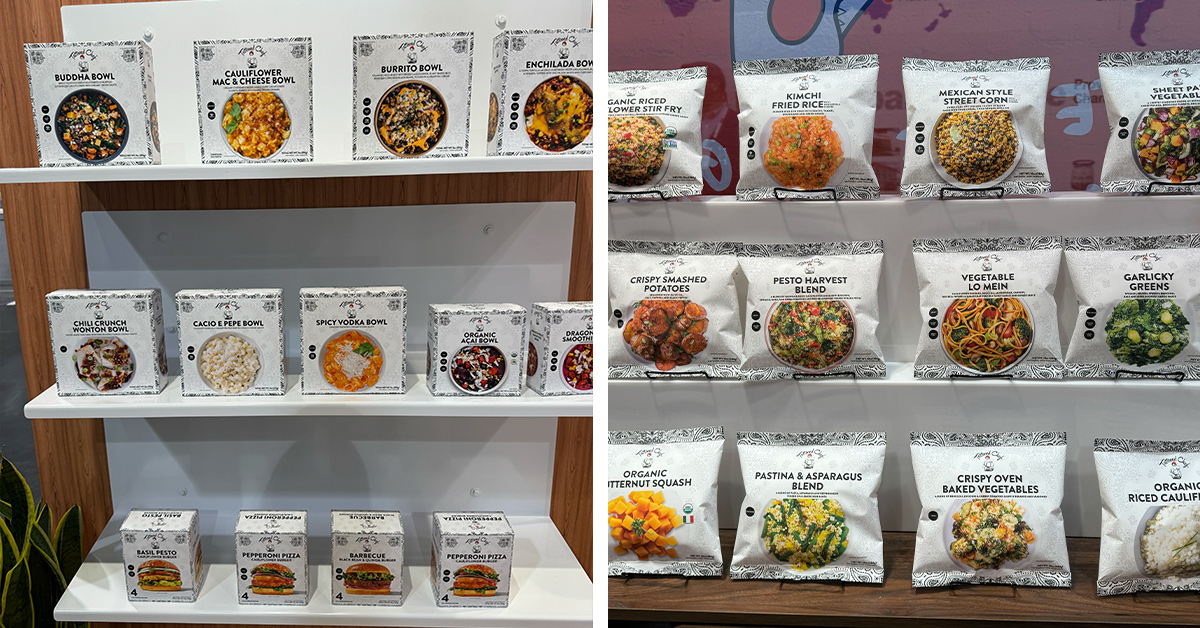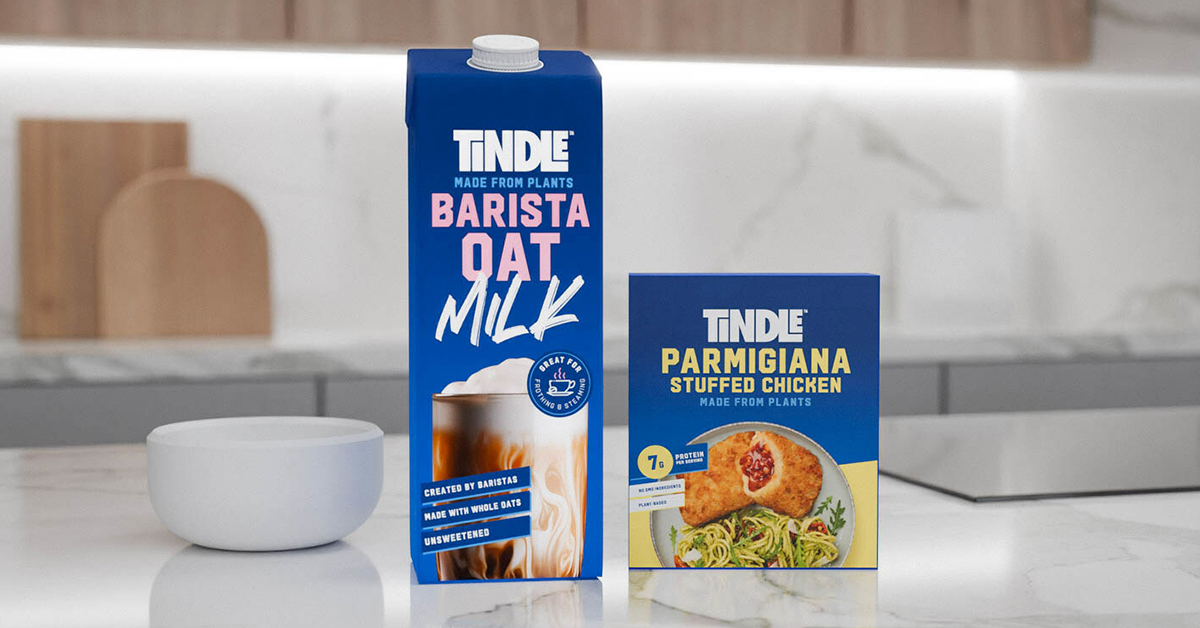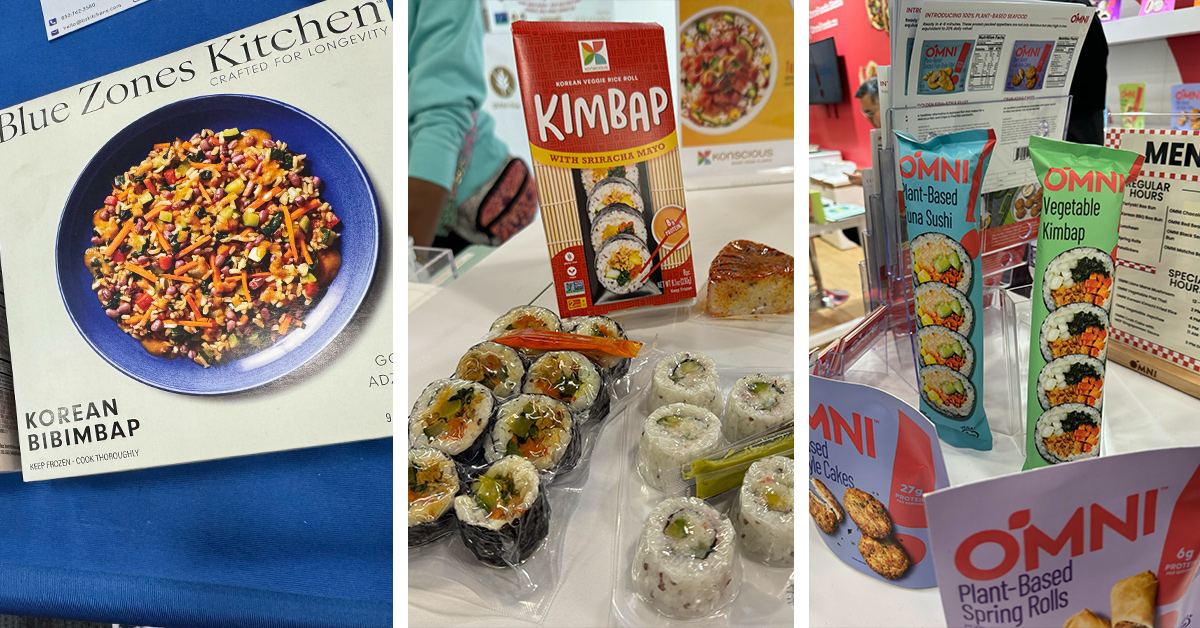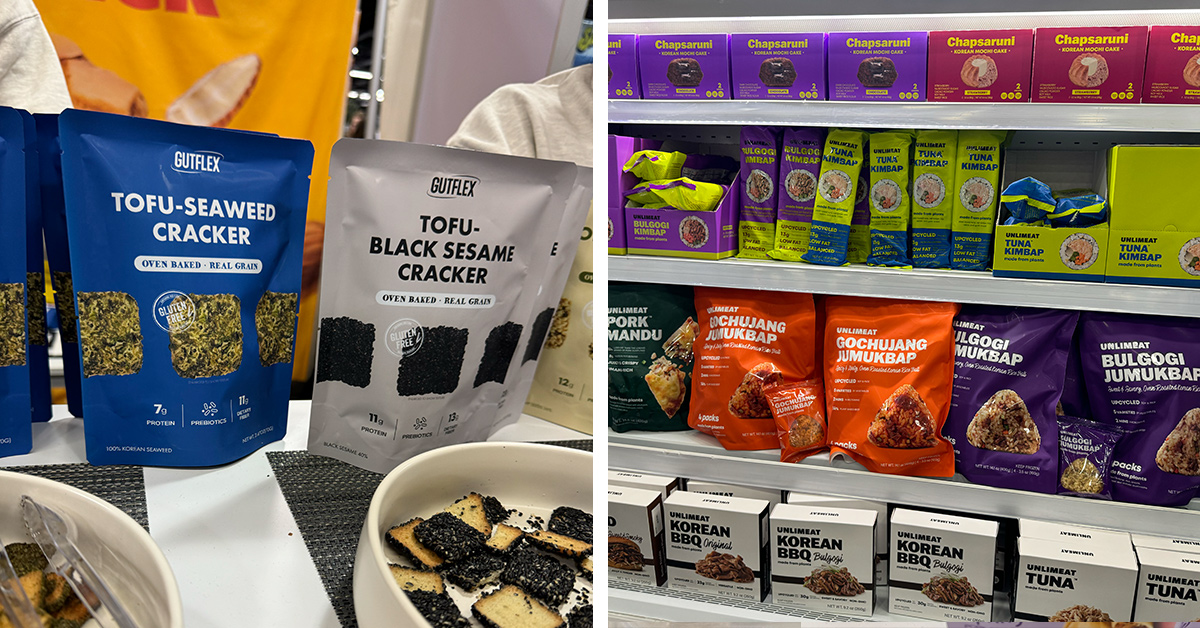Expo West Notebook: Tattooed Chef Emerges From Bankruptcy; TiNDLE Expands Into New Categories

Tattooed Chef Re-Emerges From Bankruptcy
Can we call it a comeback? Frozen plant-based food company Tattooed Chef (#765), which filed for Chapter 11 bankruptcy protections in July, was very much alive at Expo West, where the brand exhibited dozens of new products spanning entrees and sides like Pesto Harvest Bowls, Kimchi Fried Rice and Hot Honey Brussel Sprouts as well as two acai bowls and four veggie burger varieties.
The company is now back in the hands of its original team who came together to form Planted Ventures and acquired the brand’s assets, including a production facility in Italy, for $1.5 million. The previously publicly traded company officially came under Planted Ventures ownership early this year, according to Tattooed Chef founder, Sarah Galletti.
According to Galletti, the majority of the brand’s c-suite invested to create Planted Ventures and remained in their previous roles. Galletti’s father, Salvatore Galletti, who moved to take the company public in 2019, remains CEO. She said looking ahead, Tattooed Chef is “reinvigorated” and excited to forge a path ahead with the “totally new company.”
Sarah Galletti noted that the brand has plenty of new innovations in the works while highlighting that for many new recipes, she finds inspiration on TikTok. Tattooed previously sold hundreds of frozen, plant-based ready to eat products primarily in the Mass channel with Walmart being a key retail partner.

TiNDLE Expands into New Categories Following Mwah! Acquisition
Alt-meat tech food startup TiNDLE (Booth #4905) has made its first foray into the beverage (and alt-dairy) space with its new Barista Oatmilk. The retail product leverages new capabilities obtained through parent company Next Gen Foods’ acquisition of dairy-free gelato startup Mwah last March.
Though previewed at the show, the retail-focused oatmilk isn’t slated to hit the market until late 2024. According to SVP and U.S. managing director JJ Kass, TiNDLE believes its unsweetened oatmilk will stand out in the increasingly saturated space thanks to its clean label.
“The biggest thing that we’re excited about with this is we’re hearing what consumers want in the market and it’s a clean label. We start with whole oats, not an oat powder, and because of that we get a lot of sweetness,” said Kass. The demand for clean-label non-dairy milk has been on the rise over the past few years, fueling efforts such as MALK’s #turnitaround campaign encouraging consumers to read the labels of the products.
At the booth, TiNDLE also showcased its new stuffed chicken products, available in Chicken Parmigiana and Garlic & Herb varieties. The new offerings will be available to order later this spring and, once on store shelves, will retail for $9.99-$10.99 per 4-pack. According to Kass, the brand is focusing on familiar flavors to draw consumers in before rolling out more unique stuffed chicken varieties like Tikka Masala and Katsu Curry.
Though the stuffed chicken products are currently being made in the company’s R&D center in Europe, production for the new U.S. innovation will soon be brought over to the company’s R&D facility in Chicago, established in 2022.
These retail-centric products aim to further accelerate TiNDLE’s brick-and-mortar presence. Since making its retail debut last year, the brand is available in Giant Eagle stores in the Midwest, independent retailers on the East and West Coasts like Berkeley Bowl and BESTIES Vegan Paradise, online grocery provider FreshDirect, and, most recently, Price Chopper Supermarkets.
The oatmilk’s future in food service, however, is still uncertain.
“It’s really easy for us to pull into both [channels]. We’re thinking about it for everything but it definitely has more of a retail launch plan, but we also see food service as a great way to test out the market,” said Kass.
Dr. Praeger’s Sees Veggie Burgers Grow, Pushes Crunchy
Dr. Praeger’s Sensible Foods (Booth #881) is feeling some love for its veggie burger line, as CEO Andy Reichgut told Nosh that sales of the brand’s burgers grew around 20% over the last six months.
The decades-old vegetarian foods brand has expanded its lines in recent years, adding the more meat-like Perfect Burger to its portfolio in 2019 as its answer to brands like Impossible and Beyond. However, at the brand’s booth at Expo West this week, Reichgut said it’s the more “traditional” vegetable-forward burgers, such as those made with beans or mushroom, that are providing the strongest growth for the brand.
The strength of the brand’s burger sales has helped guide its latest innovation: Crunchy Burgers in Cauliflower and Southwestern Sweet Potato varieties. The line launched in October and was sampled at the brand’s booth, alongside its other recent product launch, Veggie Fries, which debuted last summer.
Crunchy will be a key focus for the brand this year, Reichgut said, noting that the line is national in Whole Foods and will be adding Albertsons and Kroger stores over the next few months. Since the line’s October launch, he said the line had achieved a 45% ACV by January.
To promote the line, the brand is mounting a national TV advertising campaign in May.
“We think the Crunchy burger is the best way to grow the category,” he said. “The consumers who will not buy a veggie burger, one reason why they say they won’t is because they don’t like the texture. So we see this as a massive category driving initiative.”

K-Food Kraze Kontinues
A few Expo’s ago, fermented foods and Asian-inspired cuisines took over the show floor primarily in the form of new kimchi products that ranged from the traditional format to drinkable brines and flavored snacks. This year saw further adoption of Korean food, flavors and formats, with a noticeable uptick in ready-to-eat meals.
At least five brands have debuted frozen, packaged kimbap products including three plant-based varieties from Konscious Foods (#5679), Omni Foods (#N2101) and Unlimeat (#N1416). Blue Zone Kitchen (#N2141), which introduced eight frozen, plant-based dinner entrees and oatmeals at the show, added a Korean Bimbap variety to that count.
Omni Foods and Green Monday founder David Yeung explained that the brand’s innovation strategy is driven with the intent of creating products that can be consumed regularly by a global audience. Kimbap, like sushi, is currently growing in consumer awareness, he explained. That global audience – which he emphasized spans beyond the American consumer given Omni’s international footprint – will dine on pizza one night, sushi the next and Middle Eastern fare the one after that.
He said that creating a ready-to-eat plant-based sushi or kimbap product fits a need for many consumers who don’t have access to those foods locally, but are seeking new, globally-inspired food experiences at home. Tapping its Chinese roots, Omni intends to offer consumers across Europe, Asia and America easy-to-understand, plant-based ready to eat alternatives.
Additionally, South Korean brand Gut Flex (#5323) is looking to bring its Veggie and Tuna-based packaged kimbap products to American consumers alongside its 5 SKU crispy tofu cracker line which includes flavors like Black Sesame, Seaweed and Brown Rice. According to a spokesperson the brand is well established in South Korea and is looking to expand to the U.S. with its expanded snack and packaged meal lines.
















